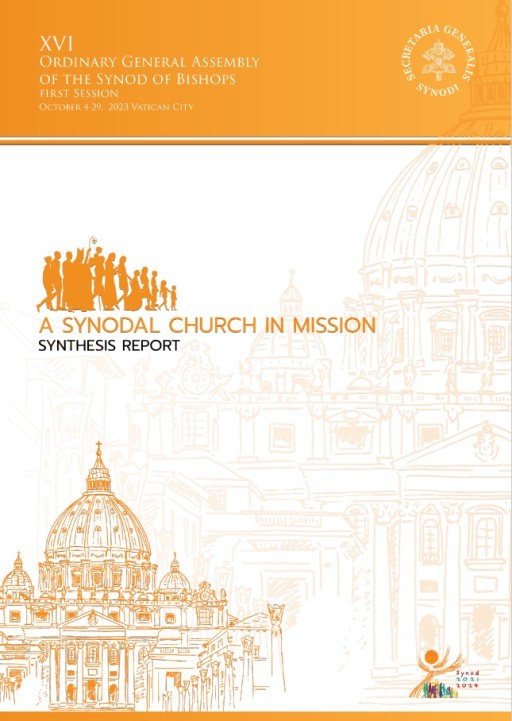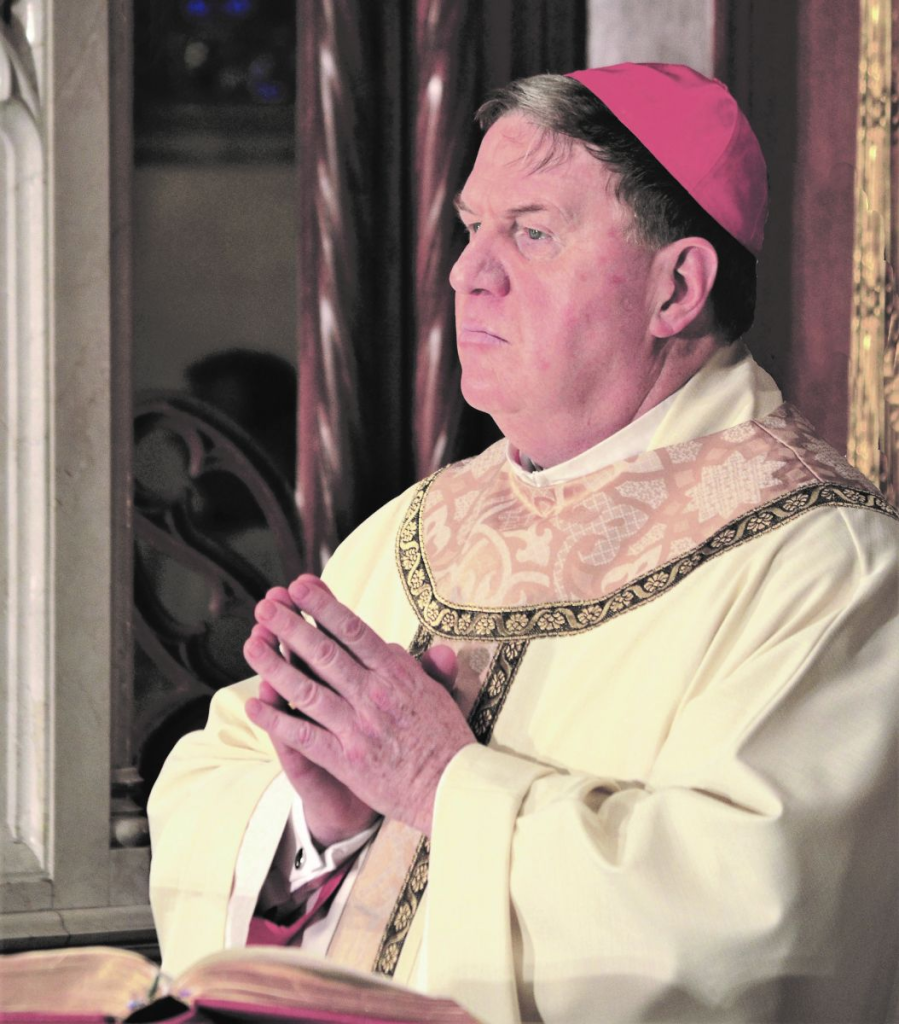From the Cardinal: The Church is mission | March 15, 2024
Click a button to jump to the section:

Vol. 5. No. 13
Rather than saying that the Church has a mission, we affirm that Church ‘is’ mission. “As the Father has sent me, so I send you” (John 20:21): the Church receives from Christ, the One who is sent by the Father, Her own mission. Supported and guided by the Holy Spirit, the Church announces and witnesses the Gospel to those who do not know it or welcome it (A Synodal Church in Mission: Synthesis Report, Part II, Number 8a).
Dear Sisters and Brothers in Christ,
Synodality calls us to be a Church in mission. The Church does not merely “have” a mission. The Church “is” mission. She is a community of missionary disciples who are sent to all the ends of the earth to announce and give witness to the Gospel of Joy. As Pope Francis frequently reminds us, the mission we have received compels us to “go forth,” especially to the outer limits of human society, the periphery.
Where do we find the periphery? The dictionary definition of periphery is “the outside edge of an area or the area that surrounds a place or thing.” But Pope Francis is not simply speaking of geography. He is also referring to those areas that contain people who are social outcasts, on the “margins” of social acceptability, as being the periphery. The pope admonishes us to step outside of our comfort zones and to open our hearts to others, especially those who have been rejected by society.
In the Gospels, Samaritans are clearly “on the periphery” of Jewish society. So are people with leprosy and those caught in sins such as adultery.
As we read in St. Matthew’s Gospel, “While he was at table in his [Levi’s/Matthew’s] house, many tax collectors and sinners came and sat with Jesus and his disciples. The Pharisees saw this and said to his disciples, ‘Why does your teacher eat with tax collectors and sinners?’ He heard this and said, ‘Those who are well do not need a physician, but the sick do. Go and learn the meaning of the words, ‘I desire mercy, not sacrifice.’ I did not come to call the righteous but sinners” (Mt 9: 10–13).
In other words, the periphery is not confined to geography or social, economic or legal status, or to our religious or political points of view. Anyone who is different from us stands outside our comfort zone.
Getting outside ourselves and going to the periphery can mean any effort to reach out to others with compassion and understanding. It does not mean that we abandon our beliefs, principles or way of life. But it does mean that we open ourselves to those who are different from us and, in so doing, share with them the good news that all are loved by God and redeemed in Christ.
Our Church’s message to people in every region of the world and in every social, economic and political environment is that we have an obligation to go to the margins of society (where our sisters and brothers who are poor can be found) and share the good news of our salvation in Jesus Christ. As people of faith, we are invited to see the poor, to allow the word of God to illuminate the reality of poverty, and to respond with transformed hearts. Our mission is to proclaim by our words and actions that we have been sent to love the poor as Jesus did.
This is what it means to be a “Synodal Church in Mission” supported and guided by the Holy Spirit. As we continue our synodal journey in this holy season of Lent, let’s ask Mary, Mother of the Church, to inspire, enlighten and guide us on our way to Christ her Son.
Sincerely yours in Christ the Redeemer,
Cardinal Joseph W. Tobin, C.Ss.R.
Archbishop of Newark

A Synodal Church in Mission: Synthesis Report
A Selection from the Synod Synthesis Report’s Part II: All Disciples, All Missionaries #8 “Church is Mission.”
Rather than saying that the Church has a mission, we affirm that Church ‘is’ mission.
Supported and guided by the Holy Spirit, the Church announces and witnesses the Gospel to those who do not know it or welcome it. They do this with that preferential option for the poor that is rooted in the mission of Jesus. In this way the Church co-operates in the coming of the Reign of God, of which She is the seed (cf. LG 5).
The sacraments of Christian initiation confer on all the disciples of Jesus the responsibility for the mission of the Church. Laymen and laywomen, those in consecrated life, and ordained ministers have equal dignity. They have received different charisms and vocations and exercise different roles and functions, but all are called and nourished by the Holy Spirit to form one body in Christ (1 Cor. 4-31). They are all disciples, all missionaries, in the reciprocal vitality of local communities who experience the delightful and comforting joy of evangelizing.
The exercise of co-responsibility is essential for synodality and is necessary at all levels of the Church. Each Christian is a mission on this earth.
The family is the pillar of every Christian community. Parents and grandparents and all those who live and share their faith in the family are the first missionaries. The family, as a community of life and love, is a privileged place of education in faith and Christian practice, one that needs special accompaniment within communities. Support is especially needed for parents who must reconcile work, including within the Church community and in service to its mission, with the demands of family life.
If the mission is a grace involving all the Church, the lay faithful contribute in a vital way to advancing that mission in all areas and in the ordinary situations of every day. Above all, it is they who make the Church present and who proclaim the Gospel, for example, in digital culture, which has such a strong impact throughout the world; in youth culture; in the world of work and business, politics, and the arts and culture; in scientific research, education, and training; in the care of our common home; and especially through participation in public life. Wherever they are present, they are called to witness to Jesus Christ in daily life and to explicitly share the faith with others. In a special way, young people, with their gifts and fragilities, growing in friendship with Jesus, become apostles of the Gospel to their peers.
The lay faithful are also increasingly present and active in service within Christian communities. Many of them organize and animate pastoral communities, serve as religious educators, theologians and formators, spiritual animators and catechists, and participate in various parish and diocesan bodies. In many regions, the life of Christian communities and the mission of the Church depends upon catechists. In addition, lay people serve in safeguarding and administration. All of these contributions are indispensable to the mission of the Church; for this reason, the acquisition of necessary competences should be provided for.
In their immense variety, the charisms of the laity represent distinct gifts to the Church from the Holy Spirit that must be called forth, recognized, and fully appreciated. In some situations, the laity may be called to help make up for the shortage of priests, with the danger that the lay character of their apostolate risks being diminished. In other contexts, it may be that priests do everything themselves and thus the charisms and ministries of the laity are ignored or underutilized. In all contexts, there is a danger, which was expressed by many at the Assembly, of clericalizing the laity, creating a kind of lay elite that perpetuates inequalities and divisions among the People of God.
The mission ad gentes is mutually enriching for the Churches, because it not only involves the missionaries themselves but the entire community, which in this way is inspired to prayer, the sharing of goods, and witness. Churches lacking clergy should not give up this commitment, while those with more vocations to the ordained ministry benefit from cooperating pastorally in a genuinely evangelical manner. All the missionaries — laymen and women, those in consecrated life, deacons and priests, and particularly the members of missionary institutes and fidei donum missionaries — are an important resource for creating bonds of knowledge and exchange of gifts. The Church’s mission is continually renewed and nourished by the Eucharist, particularly when its communal and missionary nature is fully expressed.

A Message from Pope Francis: Words of Challenge and Hope
(A selection from the Apostolic Exhortation, Evangelii Gaudium (The Joy of the Gospel), Chapter 5, “Spirit-Filled Evangelizers,” Numbers 262–263)
Spirit-filled evangelizers are evangelizers who pray and work. Mystical notions without a solid social and missionary outreach are of no help to evangelization, nor are dissertations or social or pastoral practices, which lack a spirituality which can change hearts. These unilateral and incomplete proposals only reach a few groups and prove incapable of radiating beyond them because they curtail the Gospel. What is needed is the ability to cultivate an interior space, which can give a Christian meaning to commitment and activities. Without prolonged moments of adoration, of prayerful encounter with the word, of sincere conversation with the Lord, our work easily becomes meaningless; we lose energy as a result of weariness and difficulties, and our fervor dies out.
The Church urgently needs the deep breath of prayer, and to my great joy, groups devoted to prayer and intercession, the prayerful reading of God’s word and the perpetual adoration of the Eucharist are growing at every level of ecclesial life. Even so, we must reject the temptation to offer a privatized and individualistic spirituality, which ill accords with the demands of charity, to say nothing of the implications of the incarnation. There is always the risk that some moments of prayer can become an excuse for not offering one’s life in mission; a privatized lifestyle can lead Christians to take refuge in some false forms of spirituality.
We do well to keep in mind the early Christians and our many brothers and sisters throughout history who were filled with joy, unflagging courage and zeal in proclaiming the Gospel. Some people nowadays console themselves by saying that things are not as easy as they used to be, yet we know that the Roman empire was not conducive to the Gospel message, the struggle for justice, or the defense of human dignity. Every period of history is marked by the presence of human weakness, self-absorption, complacency and selfishness, to say nothing of the concupiscence which preys upon us all.
These things are ever present in one guise or another; they are due to our human limits rather than particular situations. Let us not say, then, that things are harder today; they are simply different. But let us learn also from the saints who have gone before us, who confronted the difficulties of their own day. So I propose that we pause to rediscover some of the reasons, which can help us to imitate them today.

My Prayer for You
Please join me in praying these words from the final section of Evangelii Gaudium, #284, “Mary, Mother of Evangelization”:
Mary, Virgin and Mother,
you who, moved by the Holy Spirit,
welcomed the word of life
in the depths of your humble faith:
as you gave yourself completely to the Eternal One,
help us to say our own “yes”
to the urgent call, as pressing as ever,
to proclaim the good news of Jesus.
